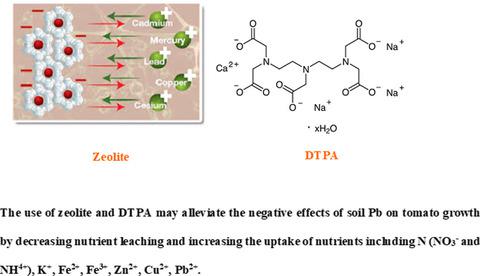当前位置:
X-MOL 学术
›
Plant Biol.
›
论文详情
Our official English website, www.x-mol.net, welcomes your
feedback! (Note: you will need to create a separate account there.)
Tomato (Lycopersicon esculentum L.) nutrient and lead uptake affected by zeolite and DTPA in a lead-polluted soil.
Plant Biology ( IF 4.2 ) Pub Date : 2019-12-22 , DOI: 10.1111/plb.13059 N Doostikhah 1, 2 , E Panahpour 2 , H Nadian 3 , A Gholami 2
Plant Biology ( IF 4.2 ) Pub Date : 2019-12-22 , DOI: 10.1111/plb.13059 N Doostikhah 1, 2 , E Panahpour 2 , H Nadian 3 , A Gholami 2
Affiliation

|
Development of alleviation strategies, which enhance plant growth under heavy metal stress, is important. Inorganic (zeolite) and organic (diethylene triamine penta-acetic acid, DTPA) amendments affecting the alleviation of lead (Pb) stress in a calcareous soil were tested by investigating leaf nutrient uptake of tomato (Lycopersicon esculentum L.) plants. Experimental quantities of lead (Pb) at 0, 50, 100 and 150 mg·kg-1 soil, zeolite (clinoptilolite) at 0%, 0.5% and 1%, and DTPA at 0, 50 and 100 mg·kg-1 soil were tested in a factorial experiment with three plant replicates. According to the anova, Pb, zeolite, DTPA and their interactions significantly affected plant concentrations of nitrogen (N), potassium (K), iron (Fe), zinc (Zn), copper (Cu), manganese (Mn) and lead (Pb). With increasing DTPA concentration at different levels of zeolite and Pb, plant concentrations of macro- and micronutrients significantly increased. Increasing soil Pb increased leaf Pb concentration and decreased the uptake of N, K, Fe, Zn, Cu and Mn. Although with increasing Pb concentration the uptake of macro- and micronutrients decreased in tomato, the use of zeolite and DTPA alleviated this stress by increasing nutrient uptake compared to the control. Interestingly, however, increased levels of zeolite and DTPA led to a decreased uptake of nutrients by plants (compared with control), indicating the absorption of such nutrients by the two amendments and their partial release for further plant use. Zeolite and DTPA may alleviate the negative effects of soil Pb on tomato growth by decreasing nutrient leaching and increasing plant nutrient uptake.
中文翻译:

在铅污染的土壤中,沸石和DTPA会影响番茄(Lycopersicon esculentum L.)的养分和铅吸收。
重要的是,制定缓解策略以增强植物在重金属胁迫下的生长。通过研究番茄(Lycopersicon esculentum L.)植物叶片养分的吸收,对影响钙质土壤中铅(Pb)胁迫缓解的无机(沸石)和有机(二亚乙基三胺五乙酸,DTPA)修饰剂进行了测试。在0、50、100和150 mg·kg-1的土壤中的铅(Pb),在0%,0.5%和1%的沸石(斜发沸石)和在0、50和100 mg·kg-1的土壤中的DTPA的实验量在三个工厂重复的析因实验中进行了测试。根据方差分析,铅,沸石,DTPA及其相互作用显着影响了植物的氮(N),钾(K),铁(Fe),锌(Zn),铜(Cu),锰(Mn)和铅(铅)。随着在不同水平的沸石和Pb上DTPA浓度的增加,大量和微量营养素的植物浓度显着增加。增加土壤铅含量可以增加叶片铅含量,并减少对氮,钾,铁,锌,铜和锰的吸收。尽管随着Pb浓度的增加,番茄中微量元素和微量元素的吸收减少,但是与对照相比,沸石和DTPA的使用通过增加营养素的吸收减轻了这种压力。然而,有趣的是,沸石和DTPA含量的增加导致植物对养分的吸收减少(与对照相比),表明两种养分吸收了这些养分,并将其部分释放以进一步用于植物。
更新日期:2019-12-22
中文翻译:

在铅污染的土壤中,沸石和DTPA会影响番茄(Lycopersicon esculentum L.)的养分和铅吸收。
重要的是,制定缓解策略以增强植物在重金属胁迫下的生长。通过研究番茄(Lycopersicon esculentum L.)植物叶片养分的吸收,对影响钙质土壤中铅(Pb)胁迫缓解的无机(沸石)和有机(二亚乙基三胺五乙酸,DTPA)修饰剂进行了测试。在0、50、100和150 mg·kg-1的土壤中的铅(Pb),在0%,0.5%和1%的沸石(斜发沸石)和在0、50和100 mg·kg-1的土壤中的DTPA的实验量在三个工厂重复的析因实验中进行了测试。根据方差分析,铅,沸石,DTPA及其相互作用显着影响了植物的氮(N),钾(K),铁(Fe),锌(Zn),铜(Cu),锰(Mn)和铅(铅)。随着在不同水平的沸石和Pb上DTPA浓度的增加,大量和微量营养素的植物浓度显着增加。增加土壤铅含量可以增加叶片铅含量,并减少对氮,钾,铁,锌,铜和锰的吸收。尽管随着Pb浓度的增加,番茄中微量元素和微量元素的吸收减少,但是与对照相比,沸石和DTPA的使用通过增加营养素的吸收减轻了这种压力。然而,有趣的是,沸石和DTPA含量的增加导致植物对养分的吸收减少(与对照相比),表明两种养分吸收了这些养分,并将其部分释放以进一步用于植物。











































 京公网安备 11010802027423号
京公网安备 11010802027423号